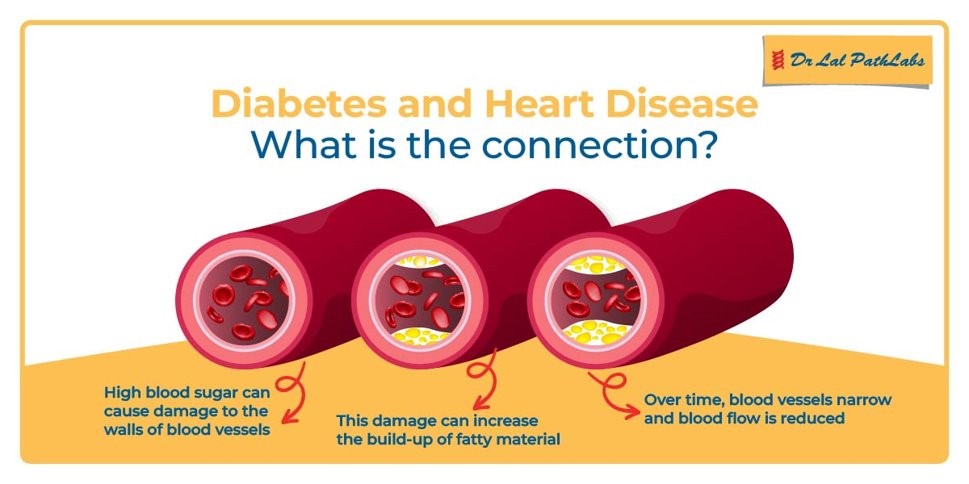Connection Between Diabetes and Heart Disease: How Diabetes Affects The Heart?
Diabetes and Heart Diseases
Heart disease is highly prevalent among individuals with diabetes. According to data from the National Heart Association in 2012, it was found that approximately 65% of people with diabetes are at risk of succumbing to heart disease or stroke. People with diabetes are more than twice as likely to suffer from heart disease or stroke compared to those who don’t have diabetes.
 What is heart disease?
What is heart disease?
Heart disease, which is also referred to as cardiovascular disease, encompasses several conditions that impact the functioning of the heart and blood vessels.
Coronary artery disease is the most common form of heart disease, characterized by the narrowing or blockage of the coronary arteries that supply oxygen-rich blood to the heart muscle. This can lead to chest pain (angina), heart attacks, or other complications.
Heart failure occurs when the heart cannot pump blood effectively, leading to fatigue, shortness of breath, and fluid retention. Arrhythmias refers to irregular heart rhythms that can disrupt the normal pumping function of the heart.
Heart valve problems involve issues with the valves that regulate blood flow in and out of the heart. These problems can cause valve leakage or narrowing, affecting the heart’s ability to function properly.
A stroke occurs when the blood flow to the brain is stopped or blocked. This is usually due to a blood clot or a blockage in the arteries.
How does Diabetes Affect your Heart?
Damage to blood vessels: Diabetes can damage the blood vessels throughout your body, including those supplying the heart. This damage affects the ability of blood vessels to dilate and constrict properly, compromising the flow of oxygen and nutrients to the heart muscle. Over time, this can weaken the heart and increase the risk of heart failure.
High blood pressure: Diabetes is often accompanied by high blood pressure (hypertension). High blood pressure strains the heart, forcing it to work harder to pump blood throughout the body. This can lead to the thickening and stiffening of the heart muscle, raising the risk of heart disease and heart failure.
Abnormal cholesterol levels: People with diabetes often have abnormal cholesterol levels, including high levels of LDL (bad) cholesterol and triglycerides, and low levels of HDL (good) cholesterol. This unhealthy cholesterol profile contributes to the development of atherosclerosis, where fatty plaques accumulate in the arteries, increasing the risk of heart disease.
Diabetic cardiomyopathy: Diabetes can cause a condition known as diabetic cardiomyopathy, which affects the structure and function of the heart. It involves changes in the heart muscle, leading to impaired pumping ability and an increased risk of heart failure.
Autonomic neuropathy: Diabetes-related autonomic neuropathy can affect the nerves that control the heart and blood vessels. This can disrupt normal heart rate and blood pressure regulation, increasing the risk of heart rhythm abnormalities and other cardiovascular complications.
Symptoms of Heart Disease
The symptoms of heart disease can differ based on the condition and how serious it is. Here are some common symptoms that may indicate the presence of heart disease:
- Chest pain or discomfort
- Shortness of breath
- Fatigue
- Rapid or irregular heartbeat
- Dizziness or lightheadedness
- Swelling
- Nausea or stomach discomfort
Testing for Heart Disease
Here are some common tests used to detect and evaluate heart disease:
- Electrocardiogram (ECG/EKG): This test records the electrical activity of the heart to detect any abnormal heart rhythms (arrhythmias) or signs of a previous heart attack.
- Stress test: Also known as an exercise stress test or treadmill test, it assesses how your heart performs during physical activity.
- Echocardiogram: This test uses sound waves (ultrasound) to create images of the heart’s structure and function.
- Blood tests: Blood tests can measure various factors related to heart health, including cholesterol levels, triglycerides, C-reactive protein (CRP), and certain enzymes that indicate heart muscle damage.
How can I lower my chances of heart attack if I have diabetes?
If you have diabetes, there are several steps you can take to lower your chances of developing heart disease or managing existing heart conditions.
- Manage your blood sugar levels: Keeping your blood sugar levels within a target range is crucial for reducing the risk of heart disease.
- Adopt a heart-healthy diet: Include a variety of fruits, vegetables, and whole grains in your meals. Choose lean sources of protein, such as poultry, fish, beans, and legumes. Include sources of healthy fats in your diet, such as nuts, seeds, avocados, and olive oil. Limit your consumption of processed foods, which are often high in unhealthy fats, sugars, and sodium.
- Engage in regular physical activity: Regular exercise is beneficial for both diabetes management and heart health.
- Maintain a healthy weight: Achieving and maintaining a healthy weight is important for reducing the risk of heart disease. Losing excess weight can improve insulin sensitivity and blood sugar control.
- Control blood pressure and cholesterol levels: High blood pressure and abnormal cholesterol levels are common in individuals with diabetes and significantly increase the risk of heart disease. Monitor your blood pressure regularly and keep it within a healthy range.
- Quit smoking: Smoking is a major risk factor for heart disease and can worsen the complications of diabetes. If you smoke, take steps to quit smoking.
- Manage stress: Chronic stress can have a negative impact on heart health. Practice relaxation techniques (deep breathing, meditation, yoga), and engage in hobbies or activities you enjoy.
- Regular medical check-ups: Stay up to date with routine check-ups and screenings to monitor your overall health and detect any potential risk factors or complications early on.













